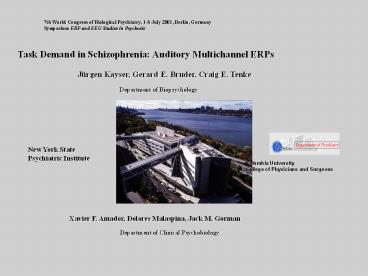Task%20Demand%20in%20Schizophrenia:%20Auditory%20Multichannel%20ERPs - PowerPoint PPT Presentation
Title:
Task%20Demand%20in%20Schizophrenia:%20Auditory%20Multichannel%20ERPs
Description:
7th World Congress of Biological Psychiatry, 1-6 July ... binaural. dichotic. binaural. dichotic /ka/ /ka/ E. C. E. G. D. E. Delayed. Left. or. Right. Press ... – PowerPoint PPT presentation
Number of Views:51
Avg rating:3.0/5.0
Title: Task%20Demand%20in%20Schizophrenia:%20Auditory%20Multichannel%20ERPs
1
7th World Congress of Biological Psychiatry, 1-6
July 2001, Berlin, Germany Symposium ERP and EEG
Studies in Psychosis
Task Demand in Schizophrenia Auditory
Multichannel ERPs
Jürgen Kayser, Gerard E. Bruder, Craig E. Tenke
Department of Biopsychology
New York State Psychiatric Institute
Columbia University College of Physicians and
Surgeons
Xavier F. Amador, Dolores Malaspina, Jack M.
Gorman
Department of Clinical Psychobiology
2
Background
3
Background (cont.)
4
Stimuli and Procedure
Tonal Complex Tones
square waves 264 .. 485 Hz corresponding
to major notes
5
Demographic Data
Controls (n26)
Patients (n26)
schizophrenia (n19) schizoaffective (n7)
DSM-IV diagnosis
BPRS
34.1 10.6
13 female 13 male
10 female 16 male
Gender
Age
33.2 10.9
35.5 11.7
Handedness (Oldfield, 1971)
84.7 24.7
84.8 12.8
6
Behavioral Data
P .003
P .007
Percent Correct
Tones
Syllables
Tones
Syllables
Oddball Task
Dichotic Listening Task
7
Oddball Task Targets
8
Dichotic Listening Task Matches
9
ERP Waveforms Vertex
N1
N1
N2
Tones
Slow Wave
Slow Wave
P3
N1
N1
N2
Syllables
Slow Wave
Slow Wave
P3
Oddball Task
Dichotic Listening Task
10
ERP Topographies Surface Potentials
Time interval 0 - 990 ms
Oddball Task
Dichotic Listening Task
Tones
Syllables
Tones
Syllables
Controls (n 26)
Patients (n 26)
11
PCA Factor Loadings
- covariance matrix
- unscaled Varimax rotation
N100
P280
N200
S880
P410
12
ERP Topographies N100
N100
Oddball Task
Dichotic Listening Task
Controls (n 26)
Patients (n 26)
Tones
Syllables
Tones
Syllables
13
ERP Topographies N200
N200
Oddball Task
Dichotic Listening Task
Controls (n 26)
Patients (n 26)
Tones
Syllables
Tones
Syllables
14
ERP Topographies P280
P280
Oddball Task
Dichotic Listening Task
Controls (n 26)
Patients (n 26)
Tones
Syllables
Tones
Syllables
15
ERP Topographies P410
P410
Oddball Task
Dichotic Listening Task
Controls (n 26)
Patients (n 26)
Tones
Syllables
Tones
Syllables
16
ERP Topographies S880
S880
Oddball Task
Dichotic Listening Task
Controls (n 26)
Patients (n 26)
Tones
Syllables
Tones
Syllables
17
Summary
- ERP components with maximum differences as a
function of task demand were - N2-P3 complex simple oddball tasks
- late positive complex more demanding dichotic
listening tasks
18
Summary (cont.)
- ERP of schizophrenic patients were characterized
by - markedly reduced early negativities (N1, N2),
particularly for simple oddball tasks - a failure to show stimulus-dependant N2
asymmetries - markedly reduced N2 differences as a function of
task demand
deficit in automatic stimulus classification
- no reduction in P3 amplitude, particularly for
simple tasks using tonal stimuli, - for which no performance deficits were observed
schizophrenic patients may compensate for
deficits in early automatic processing with more
effortful processing when possible
- no P3 asymmetry
- asymmetrical reduction only with more severe
illness? - asymmetrical functional reduction only with
asymmetrical structural abnormalities?
- reductions in late positive slow wave,
independent of stimulus type and cognitive demand
precise meaning unclear
- left-lateralized reduction in late positivity /
P3(00) ? - late asymmetric, response-related (?)
negativities
19
Medication Status
Oddball Task
N1
N2
P3
Bruder et al (2001). Biol Psychiatry, in press.
20
Behavioral Asymmetry and N2 Asymmetry
Bruder et al (1999). Arch Gen Psychiatry,
56267-276.
21
Behavioral Performance and ERP Amplitude
Oddball Task
Kayser et al (2001). Biol Psychiatry, 49 832-847.
22
Continuous Word Recognition Memory
Kayser et al (1999). Int J Psychophysiol, 34
249-265.
23
Dot Enumeration Task
Bruder et al (1998). J Abnorm Psychol, 107
399-411.































